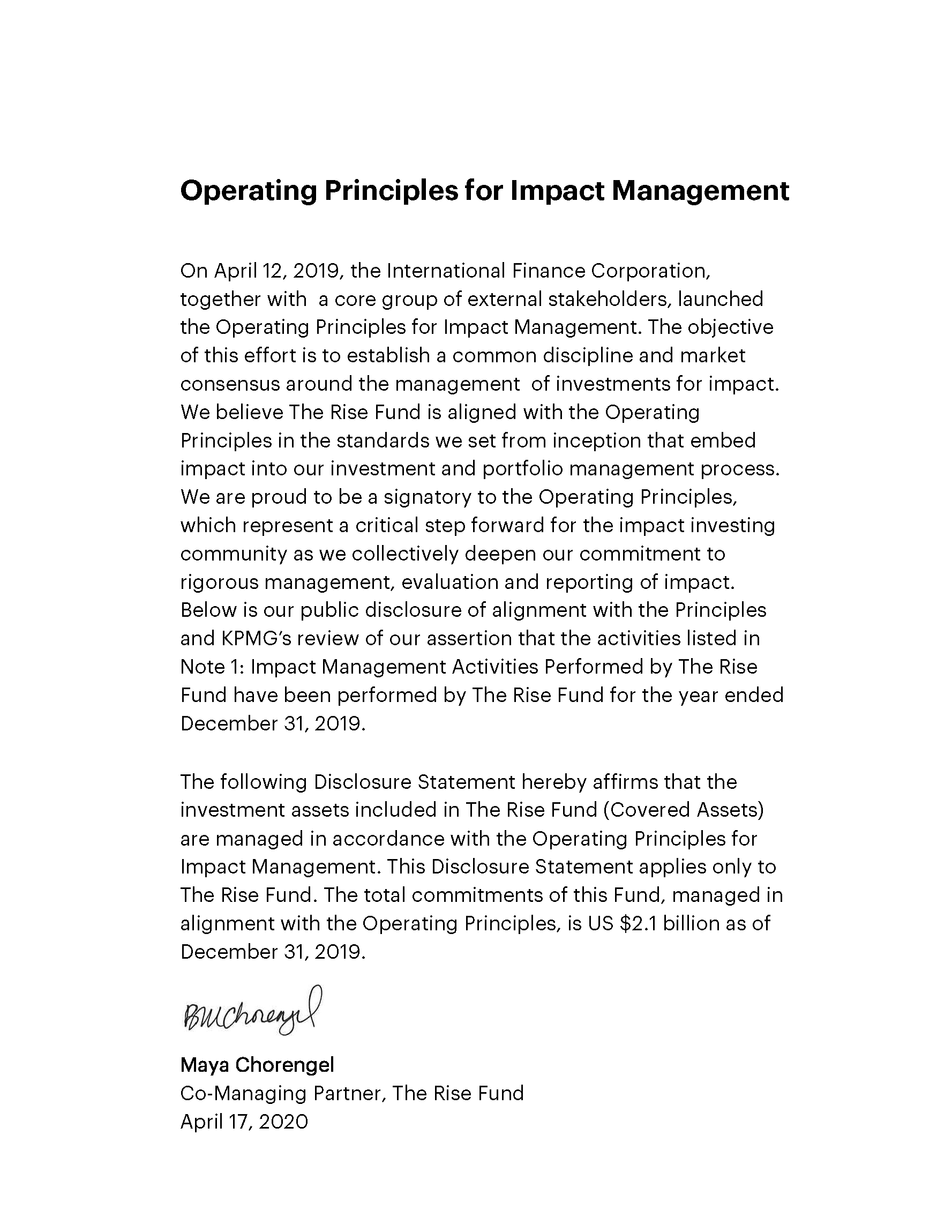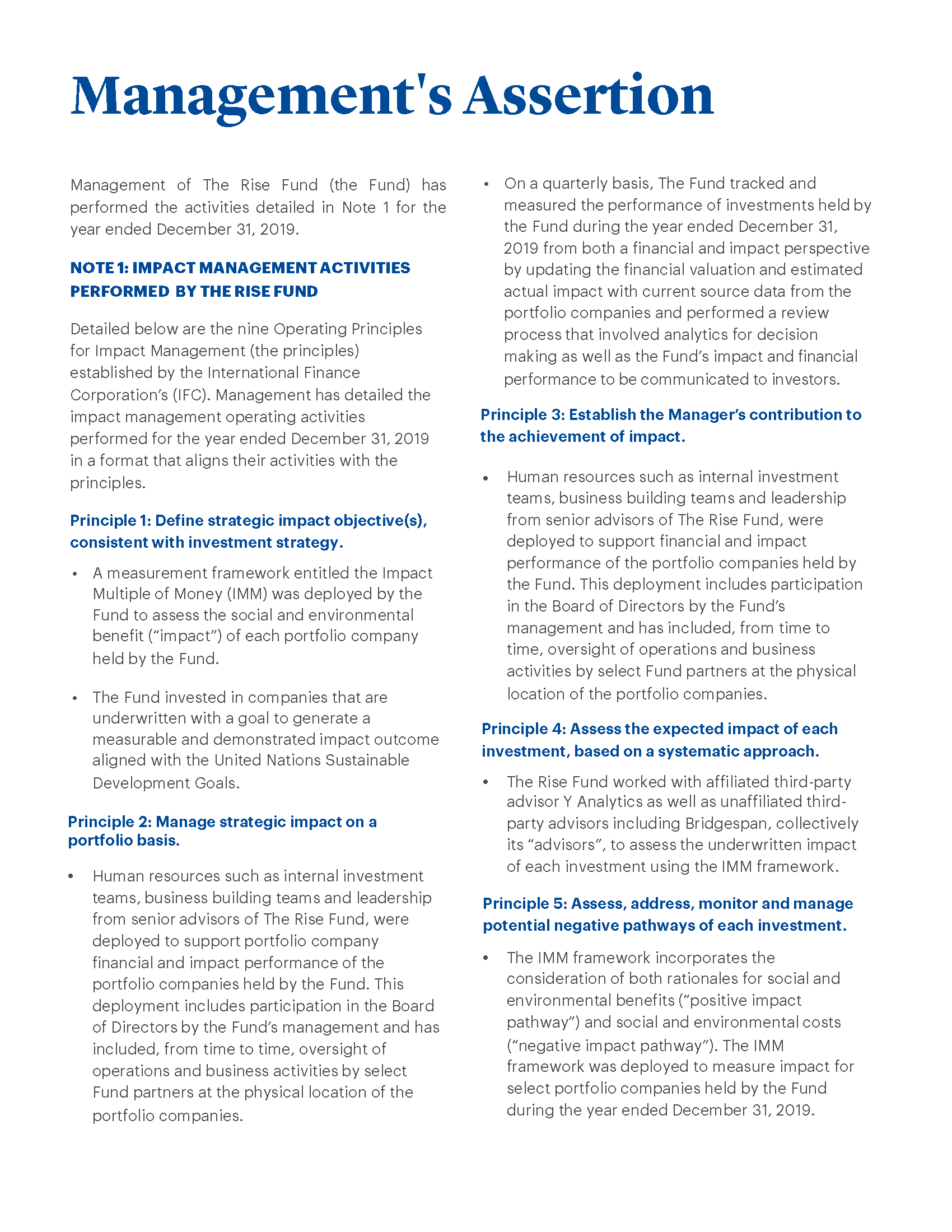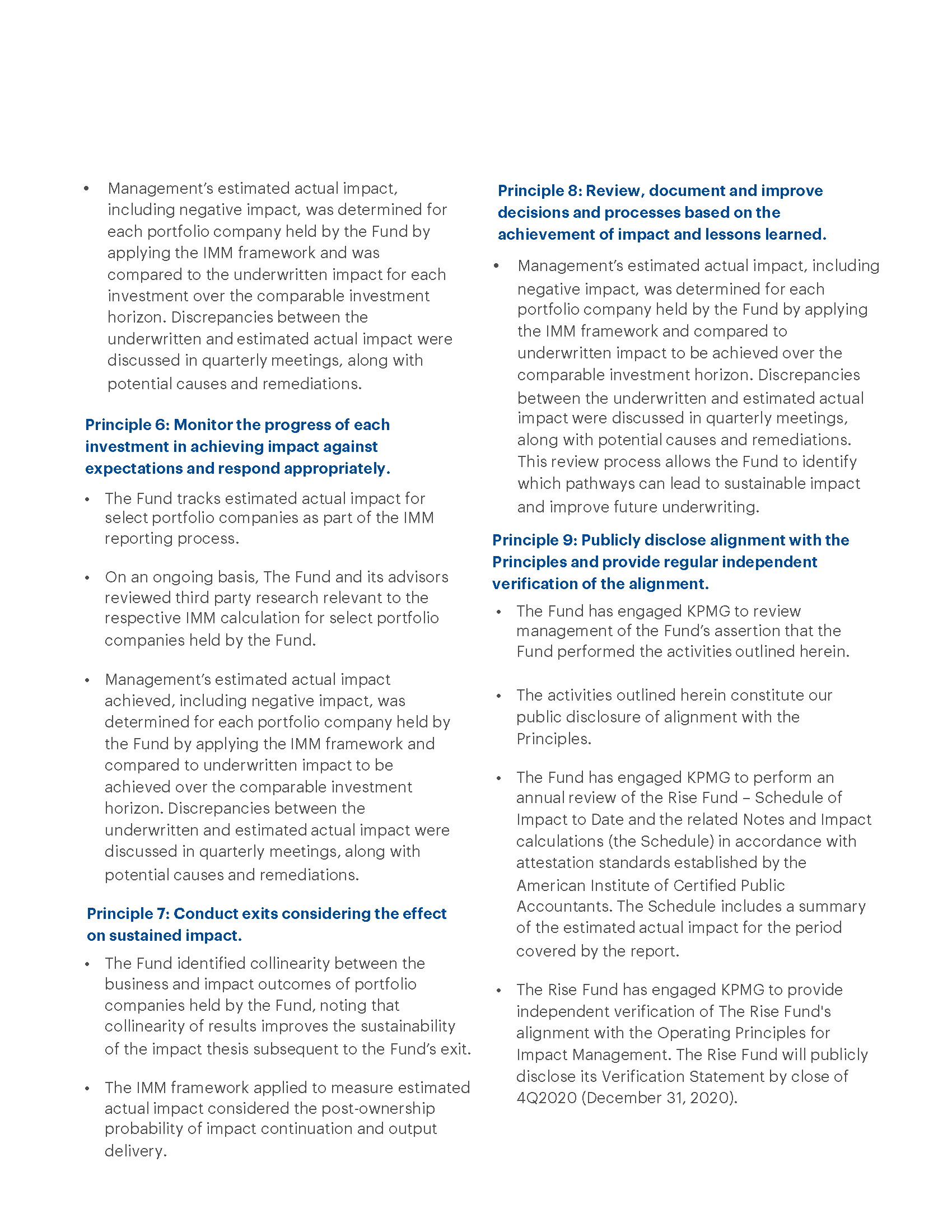Operating Principles for Impact Management
On April 12, 2019, the International Finance Corporation, together with a core group of external stakeholders, launched the Operating Principles for Impact Management. The objective of this effort is to establish a common discipline and market consensus around the management of investments for impact. We believe The Rise Fund is aligned with the Operating Principles in the standards we set from inception that embed impact into our investment and portfolio management process. We are proud to be a signatory to the Operating Principles, which represent a critical step forward for the impact investing community as we collectively deepen our commitment to rigorous management, evaluation and reporting of impact. Below is our public disclosure of alignment with the Principles and KPMG’s review of our assertion that the activities listed in Note 1: Impact Management Activities Performed by The Rise Fund have been performed by The Rise Fund for the year ended December 31, 2019.
The following Disclosure Statement hereby affirms that the investment assets included in The Rise Fund (Covered Assets) are managed in accordance with the Operating Principles for Impact Management. This Disclosure Statement applies only to The Rise Fund. The total commitments of this Fund, managed in alignment with the Operating Principles, is US $2.1 billion as of December 31, 2019.
![]()
Maya Chorengel
Co-Managing Partner, The Rise Fund
April 17, 2020
Management's Assertion
Management of The Rise Fund (the Fund) has performed the activities detailed in Note 1 for the year ended December 31, 2019.
NOTE 1: IMPACT MANAGEMENT ACTIVITIES PERFORMED BY THE RISE FUND
Detailed below are the nine Operating Principles for Impact Management (the principles) established by the International Finance Corporation’s (IFC). Management has detailed the impact management operating activities performed for the year ended December 31, 2019 in a format that aligns their activities with the principles.
Principle 1: Define strategic impact objective(s), consistent with investment strategy.
- A measurement framework entitled the Impact Multiple of Money (IMM) was deployed by the Fund to assess the social and environmental benefit (“impact”) of each portfolio company held by the Fund.
- The Fund invested in companies that are underwritten with a goal to generate a measurable and demonstrated impact outcome aligned with the United Nations Sustainable Development Goals.
Principle 2: Manage strategic impact on a portfolio basis.
- Human resources such as internal investment teams, business building teams and leadership from senior advisors of The Rise Fund, were deployed to support portfolio company financial and impact performance of the portfolio companies held by the Fund. This deployment includes participation in the Board of Directors by the Fund’s management and has included, from time to time, oversight of operations and business activities by select Fund partners at the physical location of the portfolio companies.
- On a quarterly basis, The Fund tracked and measured the performance of investments held by the Fund during the year ended December 31, 2019 from both a financial and impact perspective by updating the financial valuation and estimated actual impact with current source data from the portfolio companies and performed a review process that involved analytics for decision making as well as the Fund’s impact and financial performance to be communicated to investors.
Principle 3: Establish the Manager’s contribution to the achievement of impact.
- Human resources such as internal investment teams, business building teams and leadership from senior advisors of The Rise Fund, were deployed to support financial and impact performance of the portfolio companies held by the Fund. This deployment includes participation in the Board of Directors by the Fund’s management and has included, from time to time, oversight of operations and business activities by select Fund partners at the physical location of the portfolio companies.
Principle 4: Assess the expected impact of each investment, based on a systematic approach.
- The Rise Fund worked with affiliated third-party advisor Y Analytics as well as unaffiliated third-party advisors including Bridgespan, collectively its “advisors”, to assess the underwritten impact of each investment using the IMM framework.
Principle 5: Assess, address, monitor and manage potential negative pathways of each investment.
- The IMM framework incorporates the consideration of both rationales for social and environmental benefits (“positive impact pathway”) and social and environmental costs (“negative impact pathway”). The IMM framework was deployed to measure impact for select portfolio companies held by the Fund during the year ended December 31, 2019.
- Management’s estimated actual impact, including negative impact, was determined for each portfolio company held by the Fund by applying the IMM framework and was compared to the underwritten impact for each investment over the comparable investment horizon. Discrepancies between the underwritten and estimated actual impact were discussed in quarterly meetings, along with potential causes and remediations.
Principle 6: Monitor the progress of each investment in achieving impact against expectations and respond appropriately.
- The Fund tracks estimated actual impact for select portfolio companies as part of the IMM reporting process.
- On an ongoing basis, The Fund and its advisors reviewed third party research relevant to the respective IMM calculation for select portfolio companies held by the Fund.
- Management’s estimated actual impact achieved, including negative impact, was determined for each portfolio company held by the Fund by applying the IMM framework and compared to underwritten impact to be achieved over the comparable investment horizon. Discrepancies between the underwritten and estimated actual impact were discussed in quarterly meetings, along with potential causes and remediations.
Principle 7: Conduct exits considering the effect on sustained impact.
- The Fund identified collinearity between the business and impact outcomes of portfolio companies held by the Fund, noting that collinearity of results improves the sustain-ability of the impact thesis subsequent to the Fund’s exit.
- The IMM framework applied to measure estimated actual impact considered the post-ownership probability of impact continuation and output delivery.
Principle 8: Review, document and improve decisions and processes based on the achievement of impact and lessons learned.
- Management’s estimated actual impact, including negative impact, was determined for each portfolio company held by the Fund by applying the IMM framework and compared to underwritten impact to be achieved over the comparable investment horizon. Discrepancies between the underwritten and estimated actual impact were discussed in quarterly meetings, along with potential causes and remediations. This review process allows the Fund to identify which pathways can lead to sustainable impact and improve future underwriting.
Principle 9: Publicly disclose alignment with the Principles and provide regular independent verification of the alignment.
- The Fund has engaged KPMG to review management of the Fund’s assertion that the Fund performed the activities outlined herein.
- The activities outlined herein constitute our public disclosure of alignment with the Principles.
- The Fund has engaged KPMG to perform an annual review of the Rise Fund – Schedule of Impact to Date and the related Notes and Impact calculations (the Schedule) in accordance with attestation standards established by the American Institute of Certified Public Accountants. The Schedule includes a summary of the estimated actual impact for the period covered by the report.
- The Rise Fund has engaged KPMG to provide independent verification of The Rise Fund's alignment with the Operating Principles for Impact Management. The Rise Fund will publicly disclose its Verification Statement by close of 4Q2020 (December 31, 2020).


